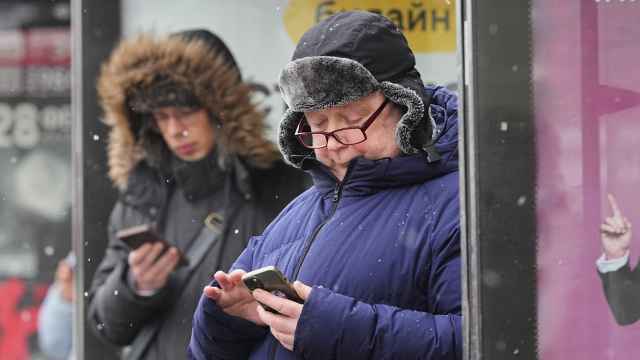Prime Minister Vladimir Putin offered a blueprint of his foreign policy priorities in a 6,060-word article Monday, but analysts said it contained little new thinking.
Putin, who is expected to win the presidential election next weekend, made some trademark attacks on Western policies over Syria and the Arab Spring and insisted that Moscow would remain a decisive global player.
He also promised that the country won’t detach itself from the outside world. “Russia is an integral part of the world. … We cannot and we do not want to isolate ourselves,” Putin said.
He said openness would allow citizens to experience more welfare, culture and trust.
The article, published in the Moskovskiye Novosti daily and on Putin’s campaign website, is the seventh in a string of publications by Putin, who has been criticized by the opposition for shunning public debate during the presidential campaign. Polls predict that he will win Sunday’s election by a large margin.
Foreign policy has not played a major role in the campaign, which has been dominated by unprecedented opposition protests against election fraud and Putin.
But Putin has lashed out against the United States, accusing it of meddling in Russia’s internal affairs by supporting some of the protest leaders.
In Monday’s article, he does not mention the “reset” with the United States, saying merely that while much has been done to develop ties in recent years, attempts to fundamentally change them have failed partly because of “persisting stereotypes and phobias.”
He explains that increasing trade and investment between both countries is the obvious way to improve political ties but complains that “regular U.S. attempts of political engineering,” including the election campaigns, counter such policies.
Putin then reiterates his criticism of U.S.-led plans to establish a European missile defense shield, which he says would reduce the country’s nuclear deterrent. He said a compromise was still possible. He also says the West backed the Arab Spring to advance its interests in the region, and that instead of promoting democracy, the revolts gave rise to religious extremism.
The reset between Washington and Moscow is widely perceived as a personal achievement of Presidents Dmitry Medvedev and Barack Obama. Medvedev has also championed a friendlier foreign policy, telling an interviewer in 2010 that Russia should display a smiling face instead of gnashing teeth that frighten others.
Recent anti-American calls by Putin and commentators on state television have heightened fears that those policies will not survive the leadership change in the Kremlin.
But analysts expressed caution over this view, saying Putin and Medvedev had coordinated much of the country’s foreign policy in the past and that Monday’s article showed more restraint than anti-Western zeal.
“On the whole, this is quite balanced,” said Nikolai Zlobin, a fellow of the World Security Institute, based in Washington.
Zlobin said the anti-Western reflex was important only for election campaigning.
Zlobin said the most striking aspect of the article was that it does not mention the country’s policies with other former Soviet states. “This is a huge omission because it has been the single biggest aspect of Moscow’s foreign policy,” he said.
Vladislav Belov, an analyst with the Moscow State Institute of International Relations, noted that relations with the United States and Europe only surfaced in the second half of the article, while the first talks at length about the “Eurasian dimension.” “For me this means that the West no longer has priority,” he said.
Belov also said Putin dwelt at length on economic interests shaping foreign policy. In a passage about “economic diplomacy,” Putin complains about prejudice against Russian businesses abroad. He recalls bitter memories of national companies’ abortive foreign investments, arguing that more effective government support and the country’s pending WTO entry would help. As examples he lists Sberbank’s 2009 attempt to buy German carmaker Opel from General Motors. He also mentions “outrageous” cases when Russian businesses ran into trouble trying to exercise their shareholders’ rights — a reference to Hungarian oil company MOL that defied Surgutneftegaz after it purchased shares in March 2009, forcing Surgut to sell in May.
A Message from The Moscow Times:
Dear readers,
We are facing unprecedented challenges. Russia's Prosecutor General's Office has designated The Moscow Times as an "undesirable" organization, criminalizing our work and putting our staff at risk of prosecution. This follows our earlier unjust labeling as a "foreign agent."
These actions are direct attempts to silence independent journalism in Russia. The authorities claim our work "discredits the decisions of the Russian leadership." We see things differently: we strive to provide accurate, unbiased reporting on Russia.
We, the journalists of The Moscow Times, refuse to be silenced. But to continue our work, we need your help.
Your support, no matter how small, makes a world of difference. If you can, please support us monthly starting from just $2. It's quick to set up, and every contribution makes a significant impact.
By supporting The Moscow Times, you're defending open, independent journalism in the face of repression. Thank you for standing with us.
Remind me later.






